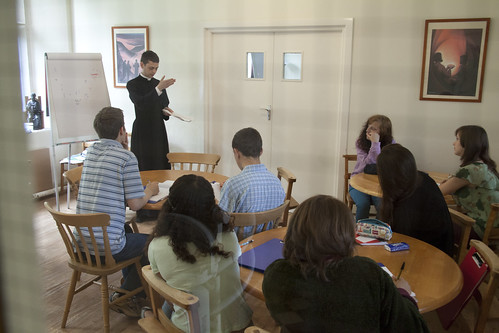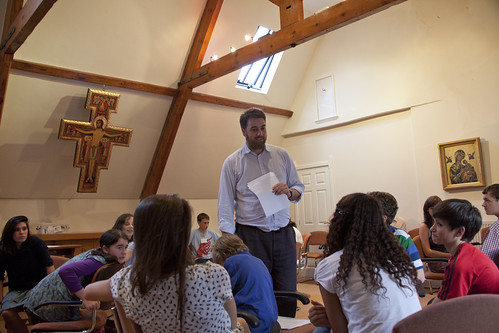 |
| This and the other photos: the SCT Summer School 2013 |
A neglected aspect of the Holy Father's Exhortation Evangelii
gaudium is his condemnation of activism and of a bureaucratic attitude.
46. Going out to others in order to reach the fringes of humanity
does not mean rushing out aimlessly into the world. Often it is better simply
to slow down, to put aside our eagerness in order to see and listen to others,
to stop rushing from one thing to another and to remain with someone who has
faltered along the way.
199. Our commitment does not consist exclusively in activities or
programmes of promotion and assistance; what the Holy Spirit mobilizes is not
an unruly activism, but above all an attentiveness which considers the other “in
a certain sense as one with ourselves”. This loving attentiveness is the
beginning of a true concern for their person which inspires me effectively to
seek their good.

279. Sometimes it seems that our work is fruitless, but mission is not like a business transaction or investment, or even a humanitarian activity. It is not a show where we count how many people come as a result of our publicity; it is something much deeper, which escapes all measurement. It may be that the Lord uses our sacrifices to shower blessings in another part of the world which we will never visit. The Holy Spirit works as he wills, when he wills and where he wills; we entrust ourselves without pretending to see striking results.
The heresy of activism is part of the heresy of Americanism, and
was condemned by Pope Leo XIII in Testem Benevolentiae Nostrae (1899):
'This overesteem of natural virtue finds a method of expression
in assuming to divide all virtues in active and passive, and it is alleged that
whereas passive virtues found better place in past times, our age is to be
characterized by the active. That such a division and distinction cannot be
maintained is patent-for there is not, nor can there be, merely passive
virtue.'
In that context it manifested itself with a mistrust of the
contemplative religious life, which was slow to root itself in North America.
Those infected by Americanism were inclined to see contemplatives as useless to
the Church. The late Fr Paul Crane recounted an anecdote of an American army chaplain in
World War II, in Italy, who, when told a community of Italian Carmelites were
starving, refused to help them, with the words 'What have they ever done for
anyone?'

An unbalanced emphasis on 'active' virtue, notably that directed towards social problems, is not what Pope Francis has been promoting in his concern for social justice. When the Church addresses social problems, she does not do so as a 'humanitarian NGO' does: Pope Francis has made this very clear. Nor is the Church a branch of the public sector, carrying out programmes of social improvement - however worthy these may be. What does this contrast, between the Church and other bodied, mean?
One part of the contrast Pope Francis has been underlining is
that the Church is always concerned with the worst kind of poverty, spiritual
poverty. As he said to the diplomatic corps:
'But there is another form of poverty! It is the spiritual
poverty of our time, which afflicts the so-called richer countries particularly
seriously. It is what my much-loved predecessor, Benedict XVI, called the
"tyranny of relativism", which makes everyone his own criterion and
endangers the coexistence of peoples.'
This is obviously something the Church is uniquely well suited to address. It should not be forgotten, of course, that there is a connection between material and spiritual poverty in the West. Although the poor in developed countries are materially better off than the poor in poor countries, the destruction of working class communities and culture, and the disastrous social and educational experiments to which they have been subjected, means that they are particularly badly off in terms of contact with the kinds of social and cultural resources which could address spiritual poverty. Mother Teresa expressed it this way:
'The greatest disease in the West today is not TB or leprosy; it is being unwanted, unloved, and uncared for. We can cure physical diseases with medicine, but the only cure for loneliness, despair, and hopelessness is love. There are many in the world who are dying for a piece of bread but there are many more dying for a little love. The poverty in the West is a different kind of poverty -- it is not only a poverty of loneliness but also of spirituality. There's a hunger for love, as there is a hunger for God.'
'The greatest disease in the West today is not TB or leprosy; it is being unwanted, unloved, and uncared for. We can cure physical diseases with medicine, but the only cure for loneliness, despair, and hopelessness is love. There are many in the world who are dying for a piece of bread but there are many more dying for a little love. The poverty in the West is a different kind of poverty -- it is not only a poverty of loneliness but also of spirituality. There's a hunger for love, as there is a hunger for God.'
The tyranny of relativism, hunger for God, loneliness: these not seem closely connected but they are. An attitude of relativism, which is now the official ideology of the educational establishment, serves as a lens of cynicism through which to look at everything. Anything lacking cynicism is ridiculed as naive. Cynicism is safe, cool with the gang; it means you'll never be taken in. Sadly, it also makes it impossible to take any truth or any relationship seriously. The products of modern education, except to the degree that they can free themselves from this, are condemned to lonliness from people and from God by a horror of being thought gullible. They have been innoculated against Christ.
The best way to address this is by education, and the best time to address it is with children. This is why the kind of work done most characteristically by traditionalist groups, schools and summer camps and catechism for children, is very much to the point. Given the chronic lack of material resources in the traditional movement, I don't think trads have anything to be ashamed of in this regard. Wherever there are trads gathered together there is a ferment of work going on related to education and spiritual development. I wish this were so in the rest of the Church.
The SCT Summer School, supported by the Latin Mass Society, is free at the point of delivery: no one is turned away. The dates this year are 3-10th August.
Another project of the Latin Mass Society this year is sponsorsip of some places are the Roman Forum Lake Garda conference; we will also be having another one-day conference of our own in London. Watch this space for more details.
The best way to address this is by education, and the best time to address it is with children. This is why the kind of work done most characteristically by traditionalist groups, schools and summer camps and catechism for children, is very much to the point. Given the chronic lack of material resources in the traditional movement, I don't think trads have anything to be ashamed of in this regard. Wherever there are trads gathered together there is a ferment of work going on related to education and spiritual development. I wish this were so in the rest of the Church.
The SCT Summer School, supported by the Latin Mass Society, is free at the point of delivery: no one is turned away. The dates this year are 3-10th August.
Another project of the Latin Mass Society this year is sponsorsip of some places are the Roman Forum Lake Garda conference; we will also be having another one-day conference of our own in London. Watch this space for more details.

Another part of the contrast between the Church and the public sector or the humanitarian NGO, is that of mindset, even when the Church is engaged in directly addressing material poverty, as with a homeless shelter or a soup kitchen. I will address this in the next post.
Oh, no! The Summer School dates have changed from the last week of July! Bridget can't go in the first week of August; she's going on a Pilgrimage to Austria. Dom still can, though.
ReplyDelete